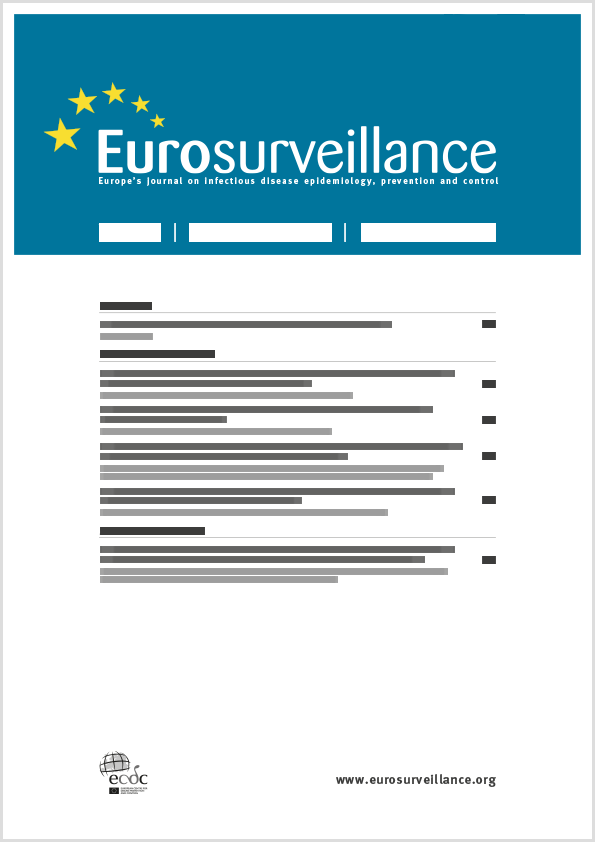- Home
- Eurosurveillance
- Previous Issues
- Volume 17, Issue 43, 25/Oct/2012
Eurosurveillance - Volume 17, Issue 43, 25 October 2012
Volume 17, Issue 43, 2012
- Rapid communications
-
-
-
Outbreak of Salmonella Thompson in the Netherlands since July 2012
More LessAn ongoing outbreak of salmonellosis due to Salmonella Thompson is affecting the Netherlands. Between 2 August and 19 October 2012, 866 cases were confirmed. Their median age was 44 years (range: 0-95 years), 63% were female and 36% were hospitalised. A matched case-control study suggested smoked salmon as the vehicle. Salmonella Thompson was confirmed in four of nine batches of smoked salmon from one producer. A recall of all concerned smoked salmon products was executed starting end of September. .
-
-
-
An invasive mosquito species Aedes albopictus found in the Czech Republic, 2012
O Šebesta , I Rudolf , L Betášová , J Peško and Z HubálekMore LessBetween July and September 2012, seventeen larvae of the invasive mosquito species Aedes (Stegomyia) albopictus (Skuse) were discovered using 60 ovitraps at four study sites alongside two main road exits in South Moravia, Czech Republic. This is the first report of imported Ae. albopictus in the Czech Republic. The findings highlight the need for a regular surveillance programme to monitor this invasive species throughout western and central Europe.
-
- Top
-
- Research articles
-
-
-
Sequence-based typing of Legionella pneumophila serogroup 1 clinical isolates from Belgium between 2000 and 2010
E Vekens , O Soetens , R De Mendonça , F Echahidi , S Roisin , A Deplano , L Eeckhout , W Achtergael , D Piérard , O Denis and I WyboMore LessSequence-based typing (SBT) is a discriminatory method widely used to genotype Legionella pneumophila strains. A total of 86 clinical L. pneumophila serogroup 1 (sg1) isolates, collected between January 2000 and December 2010 in the two Belgian National Reference Centres for Legionella pneumophila, were genotyped using the internationally standardised SBT protocol of the European Working Group for Legionella Infections (EWGLI). The isolates could be classified into 31 different sequence types (ST, index of diversity: 0.879). The obtained STs were submitted to the EWGLI SBT-database for L. pneumophila. In our study, ST47 (27.9%) and ST1 (19.8%) were the most frequently detected STs. The detected profiles were a combination of both frequently isolated and unique STs, and of both worldwide distributed and more local strains. Two STs, ST880 and ST881, were new to the EWGLI database. In conclusion, we characterised L. pneumophila sg1 isolates with the SBT method, and created a Belgian profile database that will be useful for future epidemiological studies.
-
- Top
-
- Miscellaneous
-
Volumes & issues
-
Volume 30 (2025)
-
Volume 29 (2024)
-
Volume 28 (2023)
-
Volume 27 (2022)
-
Volume 26 (2021)
-
Volume 25 (2020)
-
Volume 24 (2019)
-
Volume 23 (2018)
-
Volume 22 (2017)
-
Volume 21 (2016)
-
Volume 20 (2015)
-
Volume 19 (2014)
-
Volume 18 (2013)
-
Volume 17 (2012)
-
Volume 16 (2011)
-
Volume 15 (2010)
-
Volume 14 (2009)
-
Volume 13 (2008)
-
Volume 12 (2007)
-
Volume 11 (2006)
-
Volume 10 (2005)
-
Volume 9 (2004)
-
Volume 8 (2003)
-
Volume 7 (2002)
-
Volume 6 (2001)
-
Volume 5 (2000)
-
Volume 4 (1999)
-
Volume 3 (1998)
-
Volume 2 (1997)
-
Volume 1 (1996)
-
Volume 0 (1995)
Most Read This Month

-
-
Detection of 2019 novel coronavirus (2019-nCoV) by real-time RT-PCR
Victor M Corman , Olfert Landt , Marco Kaiser , Richard Molenkamp , Adam Meijer , Daniel KW Chu , Tobias Bleicker , Sebastian Brünink , Julia Schneider , Marie Luisa Schmidt , Daphne GJC Mulders , Bart L Haagmans , Bas van der Veer , Sharon van den Brink , Lisa Wijsman , Gabriel Goderski , Jean-Louis Romette , Joanna Ellis , Maria Zambon , Malik Peiris , Herman Goossens , Chantal Reusken , Marion PG Koopmans and Christian Drosten
-
- More Less


